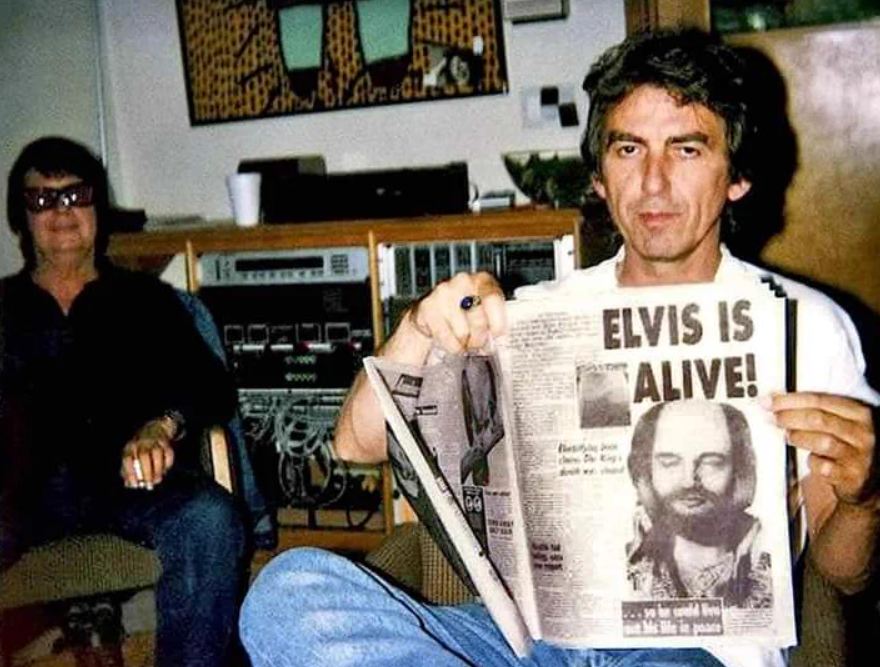In November, God Is In The TV carried out a deep dive into how AI affects contemporary culture and what it means for new and emerging creatives. We examined the way artists harness AI technology to produce and promote new music, and outlined some of the very real threats and challenges that AI poses for music, and culture. Whilst living and breathing, makers can at least protest at interference and use, but what about artists after they die? How does the notion of creative consent come into play then? A valid question over here on the cynical side of the fence when the living half of The Beatles added themselves to the 1970s demo of ‘Now and Then’ – a John Lennon song, note – and released it in November, as a single.
We know the story of how Paul McCartney, George Harrison and Ringo Starr worked on it back in 1990s with Harrison declaring it unworthy. The Beatles being a democracy, says McCartney, the idea was shelved until AI not so much shifted the goalposts but kicked them clean out of sight. We know Harrison thought the original recording inadequate for reasons of quality, but whether he’d give consent for his guitar parts to be left after his own death and if Lennon even wanted the simple, sentimental pop ballad worked on in the first place are questions left flapping in the wind like a pair of old discarded underpants on a washing line. Would John sign off on Ringo’s ‘good one’ at the song’s conclusion?
The consent issue around the work of the deceased re-entered the consciousness in the first week of 2024 with the announcement of ‘Elvis Evolution’, an “immersive concert experience” using AI technology to create a life size digital hologram of Elvis Presley from home video footage and personal photos. The show will take place in London in November, some 46 years after the death of the rock n roll, gospel, ballad, country singer, and creative visionary, at the age of 42. Participants will be taken on a time travelling journey through Elvis’ life and ‘what he went through’, before attending a concert by an AI version of him. His real story from birth to demise was akin to a Shakespearean tragedy, so that sounds fun doesn’t it. The avatar-nostalgia cash cow project that is Abba Voyage, which sees younger versions of the Agnetha, Björn, Benny, and Anni-Frid prance and dance to ABBA hits, providing the capital city with a turnover of almost £323million, led to all this.
For years now, old concert footage of white jump-suited Elvis has been slapped across giant screens in arenas, a live band sawing away on the stage below. All involved stuck in a macabre loop, night after night reenacting of the same songs sung the exact same way, played note for identical note. Elvis, chained to a treadmill after death as much as in those handcuffed 1970s Las Vegas years. His value as a master interpreter is blithely ignored in this spectacle, the popularist notion of him as a coloured-in-by-numbers comic book character and puppet, underscored each evening. The method is the message here.
The exploitation of Elvis is a supreme example of the whoring of artistry; the philharmonic orchestra albums, the forcing dead Elvis to duet with Michael Buble et al, the dramatisations of his life through a warped lens, and more. The proposed Elvis Evolution show is a collaboration between Elvis’ estate, Authentic Brands Group and immersive entertainment company Layered Reality. The latter’s chief executive Andrew McGuinness sat on the BBC Breakfast sofa this month with two orange-skinned Elvis impersonators, all giddy at the idea of the virtual concerts described with zero sense of irony, as ‘authentic’. The notion of authenticity – real, genuine, not counterfeit – does a lot of heavy lifting here. In his 1981 book ‘Dead Elvis: A Chronicle of a Cultural Obsession’, Greil Marcus’s analogy of fans and industry alike hacking hunks of flesh from Presley’s corpse and grinding them into burgers is as accurate now as it was in the aftermath of Presley’s death.
Watching and listening to an Elvis who isn’t Elvis in Elvis Evolution is surely a sign that capitalism has eaten itself, thrown up and scoffed down the vomit too along with any dog shit on the pavement. And, repeat.
With today’s technologies, Elvis – and anyone – can be made to do anything. The ultimate coercive control if you like. As if his famed manager Colonel Tom Parker is still here. Now that dear reader, is irony. The freshness and excitement, the sadness and melancholia, the emotional depths in an artist’s works are exchanged for an ‘experience’. We are told the public no longer wants to be a mere audience. They want in on the action. The way Presley himself presented his own work is found somehow wanting.
He and those who followed, now deceased, may have died decades back and their stories feel light years away from those starting out now, but there is a worrying connection with the contemporary artist. Both are further devalued, music and artistry cheapened, reduced to a throwaway experience akin to axe throwing, escape rooms and ghetto golf on a pissed-up works night out. New artists are surely aware that the goldrush is over, here in 2024. They know we expect the work they create to be largely accessed for free, the consumer assumed to be king (of rock and roll and pop and indie and whatever genre you can dream), creativity itself fast becoming a middle-class pursuit for those with the money and time to access chance and opportunity. Creative status diminished, they soldier on anyway, our heroes and heroines, stubbornly writing, playing, making. Neither new or old guard enjoy control or authority – how that’s for a great stonking mess?




